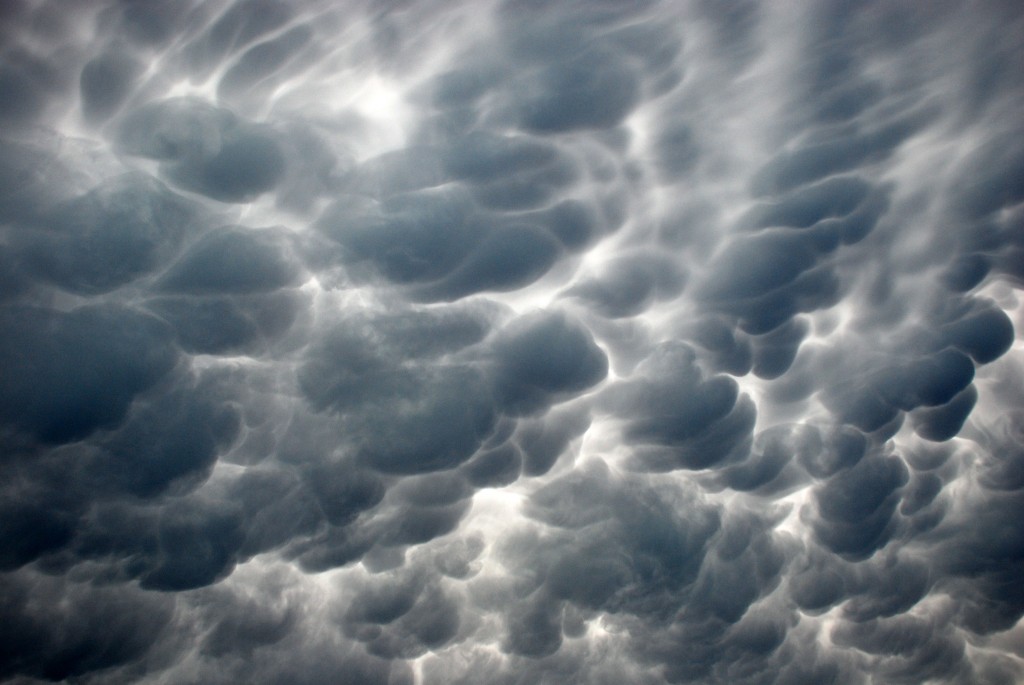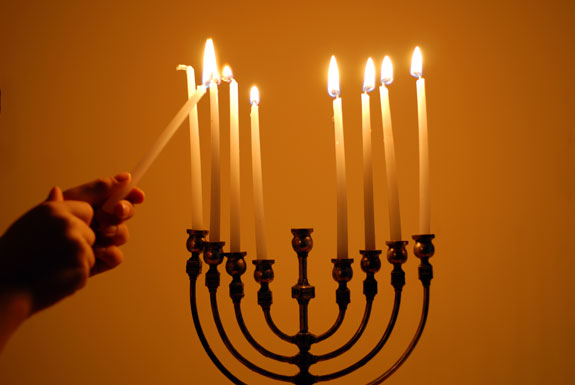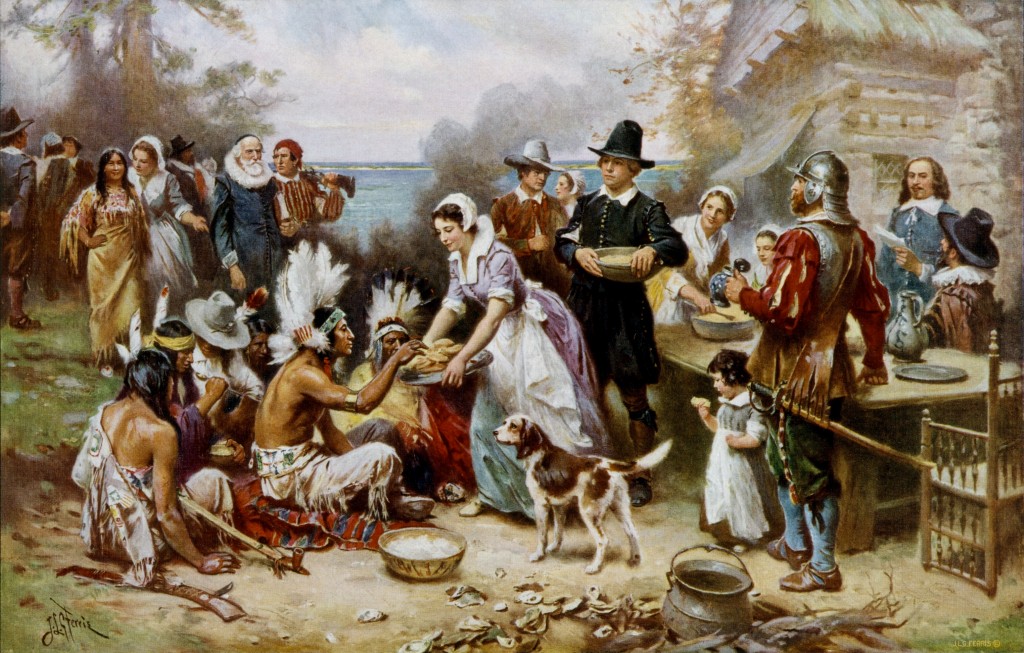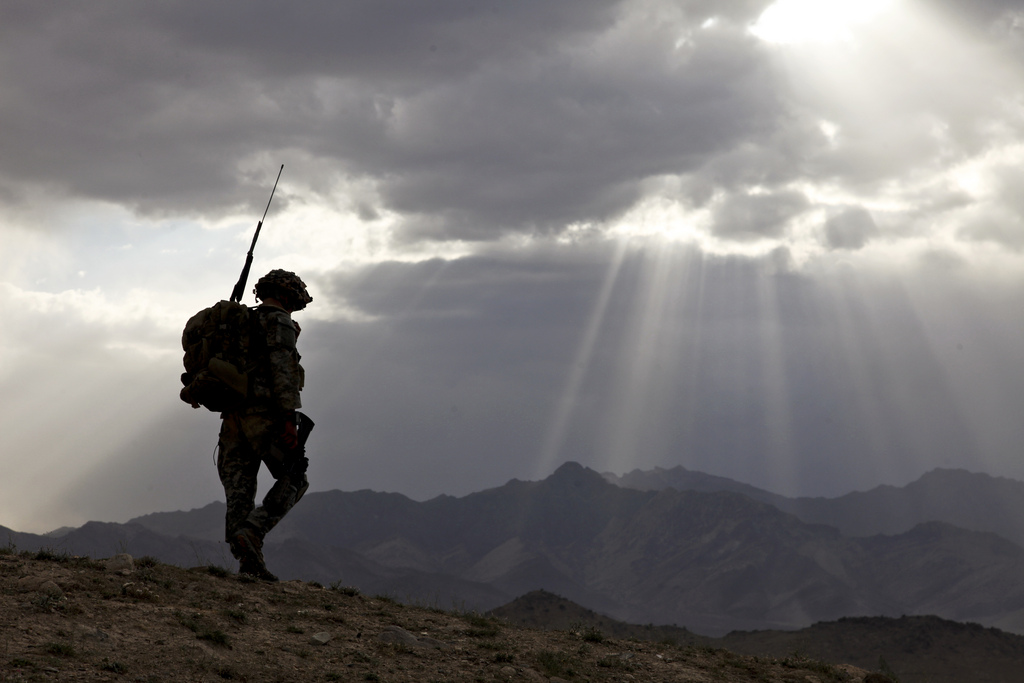Thanksgivukkah — the perfect storm
A “perfect storm” occurs when circumstances that normally operate independently from each other occur at the same time, with each heightening the other’s impact. Starting at sunset tonight, we are about to see the nexus of four circumstances that normally operate independent of each other, especially since two of those circumstances have never before occurred. Two of the four are symbolic events; and the remaining two are entirely real, with possibly cataclysmic outcomes.
I refer, of course, to the fact that Thanksgiving and Hanukkah overlap, an event that will not occur again for something between 600 and 70,000 years (depending who’s doing the calculations). This holiday nexus overlaps with two real-world occurrences, the first of their kind in America: Obamacare, which threatens to undermine America’s still-vaguely-capitalist economy, and Obama’s agreement to allow Iran, a totalitarian Islamist state with an apocalyptic religion and visions of world domination, to go ahead with its nuclear program. The real world events are deeply disturbing to those who love America and Israel (the only true democracy in the Middle East), but perhaps Someone is try to send us a sign insofar as they occur in the year of Thanksgivukkah.
Tying these four seemingly disparate strands together requires understanding fully what these strands are. I won’t bore you by repeating everything you know about Obamacare and the deal with Iran, since each can be summed up in one or two sentences. Hanukkah and Thanksgiving, however, deserve somewhat more detailed treatments.
Obamacare saw President Obama and his democrat minions use outright fraud to take over the American healthcare and insurance system in such a way as to throw most Americans off the insurance that 85% of them found satisfactory, and to dump them in an exchange that sees them lose their doctors and hospitals, all for significantly more money. It was manifestly meant to be a way-station to socialized medicine (complete with death panels), but the government’s ineptitude with regard to the exchanges meant that Obama and Co. tipped their hands as to the fraud before they were ready to do so.
Obama’s deal with Iran gives Iran permission to continue its uranium enrichment program to something just short of full weapons potential, and unlocks the money that the mullahs need to maintain their despotic hold over their country and that Iran needs to continue with its nuclear program. Obama did this after years of telling Israel not to strike at Iran’s weapons program when it was still possible for Israel to do so, using the fraudulent promise that he would protect Israel from Iran’s frequently expressed genocidal intent towards Israel. (And no, the doctrine of mutually assured destruction is not a deterrent for Iran. Iran subscribes to an apocalyptic form of Islam that differs significantly from the Christian view of the apocalypse: unlike Christians, who wait for the apocalypse, Iranian Shiites believe that it is their responsibility to bring it about.)
Put simply, we are looking at two possibly apocalyptic events, one that has the power to downgrade America irrevocably to the status of a poor, socialized nation, and the other that could witness Israel’s destruction and decades of turmoil and death in the Middle East. Knowing this can leave anyone feeling lost, hopeless, and abandoned. But I do believe that the concatenation of these events with both Hanukkah and Thanksgiving means something. That all of this occurred now might be a coincidence, or it could be part of something larger — a Divine plan, for those religiously inclined — from which we should draw hope.
For those who think of Hanukkah as a holiday that involves lighting candles, spinning dreidels, and giving gifts (the “Jewish Christmas”), let me take a few minutes to tell you about the miraculous military victory that Hanukkah commemorates, a victory that every Israeli must surely be thinking about today given Obama’s Munich-esque deal with Iran.
In 168 B.C.E., Greek soldiers in modern-day Syria (and isn’t that symbolic too?) seized the great Jewish Temple in Jerusalem and defiled it by dedicating it to Zeus. Jews passively accepted this desecration for fear of incurring Greek wrath. Human nature, though, is human nature, and you cannot appease a tyrant. Within one year, Antiochus, the Syrian-Greek emperor, declared that observing Jewish ritual was a capital crime. Instead, he said, all Jews must affirmatively worship the Greek gods.
As before, most Jews acquiesced, but they raged inside. The smoldering tinder of Jewish resistance burst into flame when Greek soldiers in the village of Modiin tried to force the Jews to bow to an idol and eat pork. Realizing that where the leader goes, the others will follow, a Greek officer focused his efforts on Mattathias, a High Priest. Mattathias refused to acquiesce to the Greek demands. In fear, another villager offered to violate Jewish law on Mattathias’ behalf. Mattathias, rather than being grateful, was outraged. He killed first the appeasing villager and then the Greek officer. Mattathias, his five sons, and a handful of villagers then killed the remaining Greeks.
Outlaws now in Greek-controlled Israel, Mattathias, his sons, and their followers hid in the m0untains and began a guerrilla campaign of resistance against the Greek occupiers. The fight came at a terrible cost. Mattathias and several of his sons died in battle, leaving only one of his sons, Judah Maccabee to carry the fight to its conclusion. As was the case with the American revolutionaries fighting their seemingly quixotic battle against the might of the British Empire (the most successful military in the world at that time), it seemed impossible to believe that the Maccabees (or Hasmoneans) could win — but they did, driving the Greeks from their lands and restoring the Temple to its rightful glory.
When the Maccabees re-claimed the Temple in Jerusalem, they knew it had been defiled by Greek religious practices, including the slaughter of swine on the altar. They believed that they could purify the Temple by burning the ritual oil in the Temple’s menorah for eight days and eight nights. The problem was that they had only enough oil left for one day and one night. Nevertheless, the triumphant Maccabees lit the menorah and a great miracle happened there (nes gadol haya sham): the menorah burned for eight days and eight nights. It is this miracle that the Jews celebrate when they light the menorah every night for the eight days of Hanukkah.
The Hanukkah story is a wonderful story of faith, commitment, and bravery. It is also a reminder that tyrannies, even those that appear to have unlimited power, are fundamentally unstable. A committed band of people can come together to topple them.
And as for Thanksgiving, that tale too, deserves to be retold, since Progressives in the past 40 years have watered it down to a story about noble Native Americans rescuing fanatically religious Pilgrims who, having broken bread with the indigenous people, returned the favor by slaughtering them. As Rush Limbaugh tells annually on his radio show and demonstrates in both See, I Told You So and in his best-selling children’s book, Rush Revere and the Brave Pilgrims: Time-Travel Adventures with Exceptional Americans
, that story is bunk. The real story is much more interesting and lays the foundation for America’s robust development. Here is my précis of Rush’s factually accurate, extremely important telling of American history:
The Pilgrims set sail for American aboard the Mayflower on August 1, 1620. Their reason for leaving the world they knew and striking how for this unknown wilderness was religious freedom. While still aboard the ship, their leader, William Bradford, had them enter into a biblically inspired agreement that came to be known as “The Mayflower Compact.” It established just and equal laws for all members of the new community, irrespective of their religious beliefs.
When the Pilgrims landed on the northeast tip of what came to be America, Bradford said that they found themselves in “a cold, barren, desolate wilderness.” They were in an isolation that was anything but splendid, one without food or shelter. In that first long, cold winter, says Rush, half the Pilgrims – including Bradford’s own wife – died of either starvation, sickness or exposure.
In the spring, the native population came to the Pilgrims’ rescue, teaching them how to harvest the land’s plant and animal bounty, an act of great kindness and humanity, and one that deserves to be remembered. As Rush says, that is the beginning and the end of most American’s understanding of the Thanksgiving story. Chapter two in every child’s history book is “and then the Pilgrims eventually killed the Indians.” There is much, much more to the story, though.
When the Pilgrims had left England, they had entered into an agreement with their merchant-sponsors in London. That agreement called for the Pilgrims to pool all their resources — their land, their crops, their meat and furs — and to draw from those resources according to their need. Karl Marx would have recognized this: “From each according to his ability; to each according to his need.”
Things did not go well. Indeed, William Bradford, who was now the colony’s governor, realized that, just as the Pilgrim’s first winter proved deadly, so too would this experiment with communism. Bradford later summed up precisely what had happened with this first “commune”:
The experience that was had in this commone course and condition, tried sundrie years, and that amongst godly and sober men, may well evince the vanitie of that conceite of Platos and other ancients, applauded by some of later times; -that the taking away of propertie, and bringing in communitie into a comone wealth, would make them happy and florishing; as if they were wiser then God. For this comunitie (so farr as it was) was found to breed much confusion and discontent, and retard much imployment that would have been to their benefite and comforte. For the yong-men that were most able and fitte for labour and servise did repine that they should spend their time and streingth to worke for other mens wives and children, with out any recompence. The strong, or man of parts, had no more in devission of victails and cloaths, then he that was weake and not able to doe a quarter the other could; this was thought injuestice. The aged and graver men to be ranked and equalised in labours, and victails, cloaths, etc., with the meaner and yonger sorte, thought it some indignite and disrespect unto them. And for mens wives to be commanded to doe servise for other men, as dresing their meate, washing their cloaths, etc., they deemd it a kind of slaverie, neither could many husbands well brooke it. Upon the poynte all being to have alike, and all to doe alike, they thought them selves in the like condition, and ove as good as another; and so, if it did not cut of those relations that God hath set amongest men, yet it did at least much diminish and take of the mutuall respects that should be preserved amongst them. And would have bene worse if they had been men of another condition. Let pone objecte this is mens corruption, and nothing to the course it selfe. I answer, seeing all men have this corruption in them, God in his wisdome saw another course fiter for them.
Put in modern English, what Bradford said was this: The ancient writers loved the theory of a commune, assuming that the doctrine of “from each according to his ability and to each according to his need” would result in universal happiness. Put into practice, though, communism bred laziness, jealousy, and discontent. The most deleterious effect was seen on young men — the most important workforce in any agriculture society — who resented deeply having to expend their labor for other men’s families without any return on effort. Redistribution of wealth ultimately meant less labor in an agrarian society, with the inevitable and dangerous decrease in the food supply. People work cheerfully, industriously, and productively only if they know there is the possibility that outcome will correlate to effort.
Made wise by experience, Bradford abolished the commune and, instead, assigned to each family a plot of land for which it was solely responsible. The result was predictable. “This had very good success, for it made all hands industrious, so as much more corn was planted than otherwise would have been.” Or, as Rush said, “supply-side economics.”
Because the Pilgrims had a personal stake in their labor, they worked hard, and produced surplus crops that they traded with the Indians or sold to British merchants. Soon, this small band of wanderers in a far-off outpost of the nascent British Empire had created a profitable, growing, and quite attractive little society.
So, where are we now? We are witnessing two events unfold, both of which have the potential to wreak terrible destruction on healthy, functioning, open democracies. And we have those two events unfolding during the once-in-a-lifetime convergence of holidays that celebrate a military victory over tyranny and an economic victory over socialism. These holidays celebrate defining moments in history. They show that, no matter how dark things appear, people of passion, intelligence, and faith can “repair the world” (hebrew: tikkun olam). A great miracle happened there, in Jerusalem; a great miracle happened there, in the Plymouth colony; and we cannot reject the idea that great miracles can still happen, whether in the Middle East or in America.
We lose under only two circumstances: we are wiped off the face of the earth (something all tyrannies have tried against the Jews, but thankfully without success) or we give up (something that too many disaffected, disheartened conservatives keep threatening to do).
Call it coincidence or call it a sign from a higher power, but the fact remains that, as Israel and her friends in America watch Obama try to include America in the Axis of Evil, and as we Americans watch a concerted effort to socialize the American economy, destroying America’s fundamental character and greatness, tonight and tomorrow serve as powerful reminders that, with faith and courage, a small band can destroy a great tyranny and that the socialist experiment can be undone with a return to greatness.
To everyone, Jewish and non-Jewish alike, I wish you a very happy Hanukkah, as we take eight days to remember that miracles do happen and that tyrants are overthrown.
And to everyone, American and non-American alike, I wish you a very happy Thanksgiving, a day on which we count the myriad blessings in our lives, both big and small, and we remember that, while socialism may temporarily mute the striving, creative, dynamic, productive, energetic parts of human nature, it cannot destroy them.




